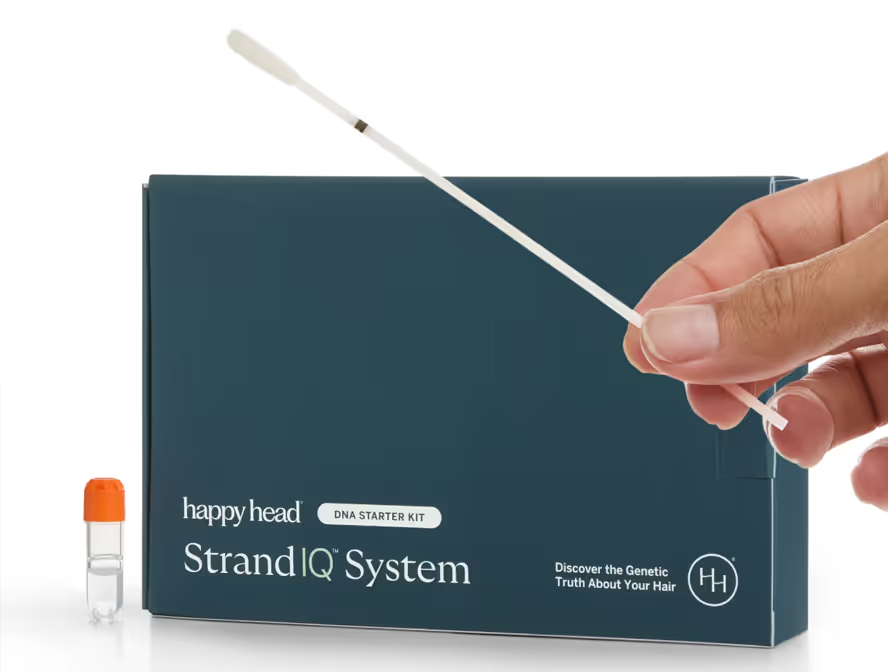You’ve probably heard vitamin A is crucial for skin health—but did you know it also plays a starring role in keeping your scalp balanced and your hair follicles healthy? From regulating sebum (your scalp’s natural oil) to supporting wound healing and hair anchoring, vitamin A (also known as retinol) is essential for a strong, hydrated, and flake-free scalp.
But here's where DNA comes into play: some people have genetic variants that either reduce their ability to convert plant-based carotenoids into active retinol, or cause their bodies to metabolize retinol too quickly. That can lead to scalp dryness, irritation, inflammation, and sluggish hair growth—even when you think you’re eating all the right foods.
The Genetic Science Behind Weak Retinol Conversion
There are two major ways genes can disrupt your vitamin A metabolism:
- Poor carotenoid-to-retinol conversion: People with variants in the BCMO1 gene may struggle to efficiently convert beta-carotene (from vegetables) into bioavailable vitamin A.
- Faster retinol breakdown: Other variants may increase the activity of enzymes that break down retinol too quickly, leading to deficiencies even with normal dietary intake.
When vitamin A levels drop, the scalp can become drier, more sensitive, and slower to heal, increasing your risk for inflammation, flakiness, or hair shedding.
How to Tell If You're at Risk
While testing your DNA is the most accurate way to identify weak retinol processing, there may be outward signs as well. These include:
- a persistently dry, flaky, or irritated scalp
- slow healing of minor scalp injuries
- hair that sheds easily or lacks volume
- difficulty improving scalp conditions, even with quality products
The good news? Tailoring your diet and utilizing personalized supplement and hair care routines like the ones available through Happy Head can help to support your body’s vitamin A levels and restore scalp balance.
What to Do Based on Your Vitamin A Processing Risk
Your personalized strategy for supporting scalp health and retinol balance depends on your genetic profile. Here's how to approach it at every risk tier:
Low Genetic Risk: Support Natural Absorption
If your Happy Head StrandIQ analysis has determined you to be at low risk for weak vitamin A levels, you only need to maintain good habits:
- Eat whole-food sources of retinol
Focus on foods like animal liver, egg yolks, butter, heavy cream, and yes—even ice cream, which contains naturally occurring retinol. - Pair vitamin A with fats
Eating retinol-rich foods with healthy fats like olive oil, yogurt, or avocado improves absorption. - Don't over-supplement
More isn't always better—excess vitamin A can be toxic. Stick to food sources unless advised otherwise.
Medium Genetic Risk: Diversify Your Sources and Monitor Intake
If your analysis has found you to be at a moderate risk for vitamin A processing issues, or if you continue to experience a dry, flaky scalp, you'll need to be more intentional:
- Comfort foods count: Surprisingly, ice cream is a good source of retinol—just watch your added sugar intake.
- Speak with a professional
If you’re considering retinol supplements or topical vitamin A for your scalp, consult a physician or registered dietitian to personalize your plan. - Gut health focus
Support intestinal health with fermented foods or probiotics, since poor gut function reduces fat-soluble vitamin absorption. - Scalp-specific topicals Consider hair or scalp serums that contain retinyl palmitate or encapsulated vitamin A to support follicle regeneration topically.
- Monitor for Symptoms
Watch for signs of subclinical deficiency—dry scalp, poor wound healing, or flaking—and track dietary consistency.
High Genetic Risk: Prioritize Bioavailable Retinol Daily
If your StrandIQ analysis has determined that your genes limit your ability to use vitamin A efficiently, take a proactive, consistent approach:
- Aim for 700–900 mcg of retinol
This varies by age, sex, and weight, so check with your healthcare provider. - Get medical guidance
High-dose vitamin A can lead to toxicity if overdone. That’s why it’s important to work with a Happy Head dermatologist to test your levels and guide supplementation. - Consider retinol-infused scalp and hair care
Topical products with vitamin A derivatives can support skin turnover and sebum regulation—but they’re best used with professional input if you’re genetically high risk.
Support Your Vitamin A Pathways for Better Hair and Scalp Health
Even if you’re genetically less efficient at processing vitamin A, you’re not doomed to dry scalp and weak hair. The key is to adjust your diet and hair care based on how your body processes retinol.
Whether through targeted nutrition, topical solutions, or professional supplementation with Happy Head, vitamin A is a powerful ally for healthy hair, balanced sebum production, and resilient scalp skin.
Resources
StrandIQ SNP Marker Count: 7
StrandIQ Genes for Trait:
CYP26B1, FFAR4, LINC01036, MACROD2, PNPLA3, RBP4, TTR
References:
Al-Khelaifi, F., et al. (2019). Metabolic GWAS of elite athletes reveals novel genetically-influenced metabolites associated with athletic performance. Scientific Reports, 9(1), 19889. PMID: 31882771.
Behar, D.M., et al. (2014). Identification of a novel mutation in the PNLIP gene in two brothers with congenital pancreatic lipase deficiency. Journal of Lipid Research, 55(2), 307–312. PMID: 24262094.
Borel, P., et al. (2017). Genetic variations associated with vitamin A status and vitamin A bioavailability. Nutrients, 9(3), 246. PMID: 28282870.
Casey, J., et al. (2011). First implication of STRA6 mutations in isolated anophthalmia, microphthalmia, and coloboma: a new dimension to the STRA6 phenotype. Human Mutation, 32(12), 1417–1426. PMID: 21901792.
Chen, Y., et al. (2023). Genomic atlas of the plasma metabolome prioritizes metabolites implicated in human diseases. Nature Genetics, 55(1), 44–53. PMID: 36635386.
Ferrucci, L., et al. (2009). Common variation in the beta-carotene 15,15'-monooxygenase 1 gene affects circulating levels of carotenoids: a genome-wide association study. American Journal of Human Genetics, 84(2), 123–133. PMID: 19185284.
Fransén, K., et al. (2013). Polymorphism in the retinoic acid metabolizing enzyme CYP26B1 and the development of Crohn’s disease. PLOS ONE, 8(8), e72739. PMID: 23977180.
Hysi, P.G., et al. (2022). Metabolome genome-wide association study identifies 74 novel genomic regions influencing plasma metabolites levels. Metabolites, 12(1), 61. PMID: 35050183.
Khan, K.N., et al. (2017). Vitamin A deficiency due to bi-allelic mutation of RBP4: There's more to it than meets the eye. Ophthalmic Genetics, 38(5), 465–466. PMID: 27892788.
Lietz, G., et al. (2012). Single nucleotide polymorphisms upstream from the β-carotene 15,15'-monoxygenase gene influence provitamin A conversion efficiency in female volunteers. Journal of Nutrition, 142(1), 161S–165S. PMID: 22113863.
Mondul, A.M., et al. (2011). Genome-wide association study of circulating retinol levels. Human Molecular Genetics, 20(23), 4724–4731. PMID: 21878437.
Pietzner, M., et al. (2021). Mapping the proteo-genomic convergence of human diseases. Science, 374(6569), eabj1541. PMID: 34648354.
Suzuki, M., et al. (2021). Disproportionate vitamin A deficiency in women of specific ethnicities linked to differences in allele frequencies of vitamin A-related polymorphisms. Nutrients, 13(6), 1743.
Suzuki, M., et al. (2022). Genetic variations of vitamin A-absorption and storage-related genes, and their potential contribution to vitamin A deficiency risks among different ethnic groups. Frontiers in Nutrition, 9, 861619. PMID: 35571879.
Thompson, D., et al. (2001). Mutations in the gene encoding lecithin retinol acyltransferase are associated with early-onset severe retinal dystrophy. Nature Genetics, 28(2), 123–124. PMID: 11431706.
Yin, X., et al. (2022). Genome-wide association studies of metabolites in Finnish men identify disease-relevant loci. Nature Communications, 13(1), 1644. PMID: 35347128.
Yousri, N.A., et al. (2018). Whole-exome sequencing identifies common and rare variant metabolic QTLs in a Middle Eastern population. Nature Communications, 9(1), 333. PMID: 29348451.
Zanon-Moreno, V., et al. (2011). Association between a SLC23A2 gene variation, plasma vitamin C levels, and risk of glaucoma in a Mediterranean population. Molecular Vision, 17, 2997–3004. PMID: 22171153.
This content, including StrandIQ™ DNA analysis reports and any Happy Head products and/or services referenced therein, is for informational and cosmetic purposes only. It is not intended to diagnose, treat, cure, or prevent any disease. This content does not constitute medical advice and should not be used to make healthcare decisions. References to prescription treatments are educational in nature. Always consult a licensed healthcare professional for any medical concerns or treatment decisions.










.avif)

